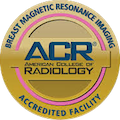- Digital Mammography
- 3D Mammography
- Breast Density
- Breast Ultrasound
- Breast MRI
- Breast Biopsy
- Ultrasound-Guided Breast Cyst Aspiration
- Bone Density (DXA)

Breast MRI
Women's Services
Breast MRI
Why is breast MRI done?
If you're at high risk of breast cancer, a breast MRI may be used to help screen you, along with an annual mammogram. Women at high risk of breast cancer have:
-
Genetic risk factors:
- About 5% to 10% of breast cancers are caused by gene defects (called mutations) inherited from a parent
- A strong family history of breast cancer (including having a mother, sister, or daughter who had breast cancer)
- A personal history of breast cancer
- A precancerous condition of the breast called atypical hyperplasia (in which abnormal cells accumulate in a breast duct)
Other common reasons for a breast MRI:
- Evaluate an unclear mammogram result
- Define the extent of breast cancer before treatment
- Evaluate breast implants for possible break or leak
What is a breast MRI?
Breast MRI uses powerful magnets and radio waves to create detailed pictures of the breast and surrounding tissue. These pictures show parts of the breast more clearly than ultrasound or mammogram. Breast MRI can be done in one or both breasts. This test does not use radiation (x-rays). Doctors can analyze the pictures on a computer or print them.
Breast MRI is more likely to find something that turns out not to be cancer (called a false positive) than mammograms:
- The false positive rate for patients at high risk for breast cancer is 20-40%.
- Even in high-risk patients, up to 80% of the time the biopsy shows no cancer. More tests and/or a biopsy will be needed to be sure there's no cancer.
- Breast MRI can't detect at least 12% of breast cancers.
Breast implants can break or leak. When this happens, it often shows on a mammogram or ultrasound, or in a physical exam. A breast MRI can show the break or leak in more detail.
Women with any of the following can’t have a breast MRI:
- Brain aneurysm clips
- Inner ear (cochlear) implants
- Some types of metal coils placed within blood vessels.
How do I prepare for a breast MRI?
We may ask you not to eat or drink anything for 4 to 6 hours before the test.
Breast MRI is safe for women with most types of metal implants. Be sure to tell the radiologist if you have:
- Heart defibrillator or pacemaker
- Recently placed artificial joints or artificial limbs
- Metal pins, screws, plates, stents, or surgical staples
- Artificial heart valve or vascular stent
- Implanted nerve stimulator
- Shrapnel, bullets, or other metal in your body from an accident.
-
Kidney disease or dialysis:
- You may not be able to receive the intravenous contrast dye used to detect cancer
- You may need a blood test to see if your kidneys are working well enough for the test
- Also tell the radiologist if you worked with sheet metal in the past. You may need tests to check for metal pieces in your eyes
Because the MRI has strong magnets, you can't take any metal or electronic objects into the MRI room. This includes:
- Jewelry, watches, credit cards, and hearing aids
- Pins, hairpins, metal zippers, and similar metallic items, which can distort MRI images
- Removable dental work
- Pens, pocket knives, and eyeglasses
- Body piercings
What should I expect during the test?
- A radiology technologist will do your breast MRI.
- You'll undress from the waist up and put on a gown.
-
You'll lie inside a narrow tube, face down on a platform specially
designed for breast MRI:
- The platform has openings for each breast so the images can be taken without compression.
- You'll need to stay very still during the breast MRI.
-
Some people:
- Feel confined when lying in the tube.
- Find the machine's buzzing and clicking noises disturbing.
- If you are very nervous about the test or think you can't lie still, ask for medicine to help relax you.
- The technologist will be available on an intercom to speak with you throughout the test.
- If cancer is present, a special intravenous contrast (dye) will be used to better show cancer, if it is present.
- The radiologist will inject the dye near the end of the test, by inserting an intravenous line into a vein in your hand or arm.
How long does a breast MRI take?
About 45 minutes.
What are the possible results from a breast MRI?
The breast MRI may:
Be normal or show benign disease
Show something that could be cancer:
If this happens, one of our breast care specialists will help you
schedule an MRI-guided biopsy to learn more.
Be inconclusive:
This is common since breast MRI shows small abnormalities.
